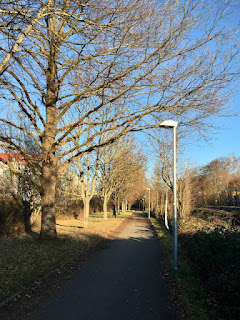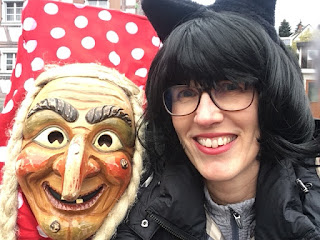Only today and tomorrow to go, and March will be here, bringing not only the spring equinox and official beginning of spring for my part of the world, but also my birthday (and that of several people dear to me) plus a mini break, a week-long course for work and most likely a pub quiz,
Last Monday (the 20th of February) was sunny, and very mild at 14C (57.2F). I spent my lunch break at my Mum's (of course having an excellent meal), and after work, my sister joined me for the first time on one of my most frequent routes, across the fields via Freiberg to Benningen.
Tuesday, the 21st of February, was equally sunny and mild. And good job it was - because due to repairs, my trains ended in Korntal, one town/stop before Weilimdorf, where I work. A replacement bus service was operating, but I had no intention of using that - it would have taken me almost as long as walking, and so I walked, still being on time for my first meeting of the day. The way back was the same; it is not a very nice walk, but the good weather helped.
 |
| This was the best part - a foot path along the rail tracks. For most of the time, I crossed from one industrial estate into the next. |
The palace is open to the public only via guided tours, and the main tours include most of the stately rooms. The special tour we had booked only took in 12 rooms, and our guide was impersonating a lady-in-waiting from the year 1808, in authentic costume and using (mostly) authentic language of the time. We had to act as if we were minor aristocrats, visiting unfortunately when the King and Queen were away, but giving the lady-in-waiting the chance to show us round a bit.
It was good fun and although I have been at the palace for tours so many times I could easily be a guide myself, there were still bits I had not known. The tour lasted well over an hour, and I was glad I had prepared well for the unheated building - at some stage, I even put my woolly hat on, and my mittens came in handy, too.
Outside, it was still mild and spring-like, but we were glad to walk the short distance to the Irish pub where I had booked a table for us. The next couple of hours were spent in the warm, cosy pub, chatting over our plates of fish & chips and pints of cider (or beer, for some); a successful and pleasant event all around.
By Thursday (Feb. 23) it was obvious that O.K. had caught a heavy cold and was not going to drive up for the weekend.
I met a friend after work; we had an excellent meal at a Greek restaurant where I'd never been before, and caught up on our news since the last time we'd met last August.
In line with the weather forecast, temperatures dropped on Friday, the 24th of February, and grey clouds replaced the sunny blue skies of the first half of the week.
My last work call ended shortly after 4:00 pm, but instead of starting my weekly cleaning right there and then, I first needed a walk, and went out for almost exactly one hour. It was nearly 7:00 pm when I called it a day with the cleaning, and spent the evening resting, watching some TV, reading and of course talking to O.K. on the phone.
Saturday (Feb. 25) brought a mix of clouds, sun and a few drops of rain eventually turning into snow.
Much of the morning was spent finishing my house work (mainly cleaning my windows - honestly, I was ashamed of how dirty they were; I don't mind household tasks at all, but for some reason I do not quite understand myself, cleaning windows is my least favourite job of all), followed by a walk across town and the old cemetery (not in use anymore, but a peaceful park), crossing the palace grounds on my way back.
 |
| A tiny green parrot? No - budding leaves on a shrub. |
 |
| Here is the name of the shrub. |
Before O.K. had caught his cold, we had booked a table for the four of us (Mum, sister, O.K. and I) at an Italian restaurant within easy walking distance from my Mum's. We still went ahead with the meal; my Mum's friend who lives on the ground floor in the same house joined us instead.
Our pizzas were good, as they always are at this place, and I even bumped into my former boss and his wife, who have become friends over the many years we've known each other.
It started to snow just as I was walking to the restaurant, and kept snowing for most of the evening.
On Sunday, the 26th of February, a powdering of snow covered the gardens I see from my kitchen window; it was cold and windy with some more snow falling.
My sister suggested a visit to Stuttgart's Rosenstein-Museum, a museum of natural history which we visited every now and then with our parents when we were kids, and always loved it.The museum is housed in a palace built to be the summer residence of King Wilhelm of Württemberg. You can read a short wikipedia article in English here.
Much to our dismay, upon arrival we saw a long queue in front of the building - almost entirely composed of families with small children. We decided to brave the queue and the crowds inside, now that we were here, and I am glad we did; yes, the noise level was almost unbearable at times, but the museum itself is still as beautiful and interesting as we remembered.
There is also a lot of information about extinct species, how we as a species are ruining the habitats of so many plants and animals, and what can be done.
 |
| A huge room is about The Sea, the lighting suggests you are under water. The floor is made to look like the real thing, too, complete with plastic waste. |
We walked through the park into the city centre, and on our third try found a place where they had a table for us, so that we could have coffee and cake (my sister) or sweet potato soup with fresh crusty bread and a soft drink (for me).
 |
| This is actually a rose garden, very beautiful in the warmer months. |
 |
| Looking back at the museum |
A train to Ludwigsburg was just a four-minute wait away afterwards, and I spent the rest of Sunday at home in my warm, clean and tidy flat, watching TV (a documentary about Harry Belafonte), reading and playing my favourite computer game (The Sims 2) as well as talking to O.K. on the phone.











































